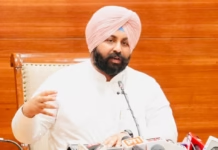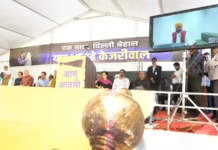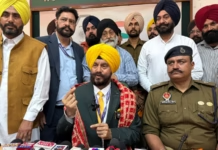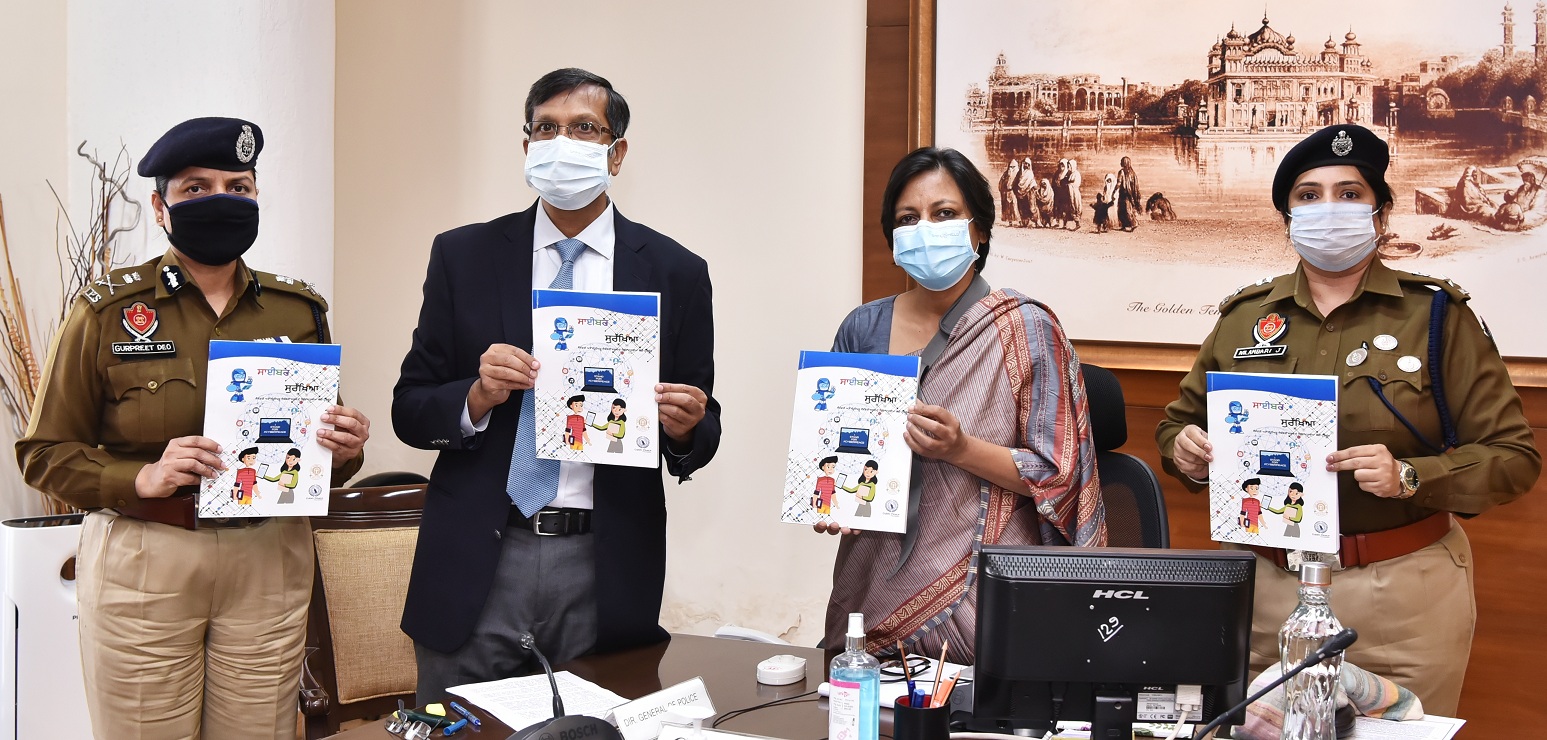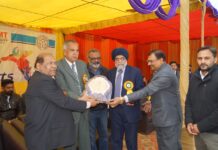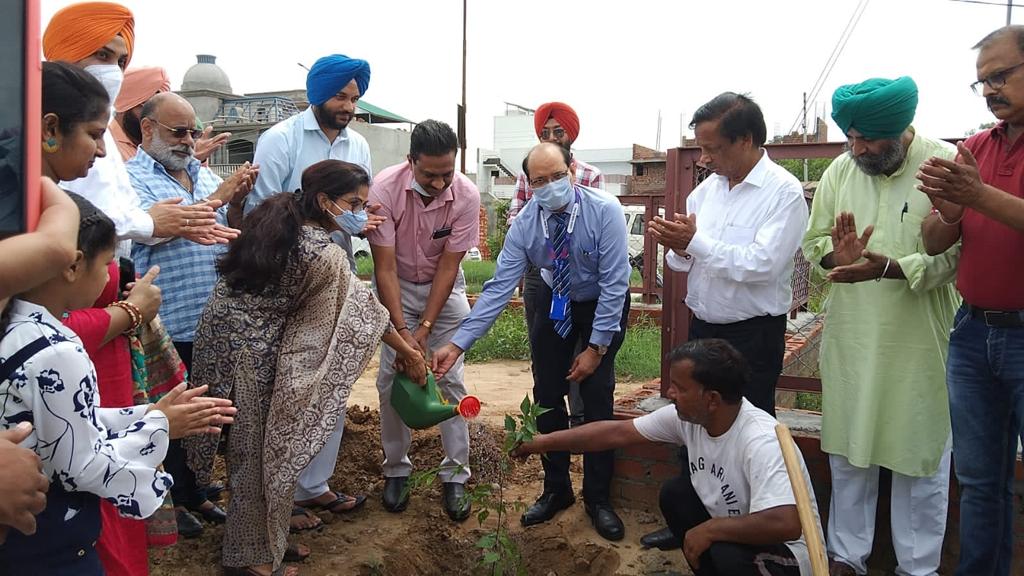Swachh Survekshan Ranking 2021 out- Punjab cities improved their rankings
The President of India Ram Nath Kovind today felicitated the awardees of the cleanest cities of India at the ‘Swachh Amrit Mahotsav’ hosted as part of Swachh Bharat Mission-Urban 2.0 by Ministry of Housing & Urban Affairs (MoHUA) at Vigyan Bhavan, New Delhi. The award ceremony, organized to recognize the good work done for Swachhata by towns/ cities, States and Union Territories under various initiatives of the Swachh Bharat Mission (Urban), viz. Swachh Survekshan 2021, Safaimitra Suraksha Challenge, and certifications for Garbage Free Star rating for cities – saw more than 300 awards under various categories being given away through the day.
For the fifth consecutive year, Indore was awarded the title of India’s Cleanest City under Swachh Survekshan, while Surat and Vijayawada bagged the second and third spots respectively in the ‘more than 1 lakh population’ category. In the population category of ‘less than 1 lakh’, Vita, Lonavala and Sasvad, all from Maharashtra, bagged the first, second and third positions respectively. Varanasi emerged as the ‘Best Ganga Town’ while Ahmedabad Cantonment won the title of ‘India’s Cleanest Cantonment’, followed by Meerut Cantonment and Delhi Cantonment. In the category of ‘Fastest Mover’, Hoshangabad (Madhya Pradesh) emerged as the ‘Fastest Mover City’ (in the ‘more than 1 lakh population’ category) with a jump of 274 ranks from 361st position in the 2020 rankings to the 87th position this year, thus securing a place among the top 100 cities.
In the State awards, Chhattisgarh, for the third consecutive year emerged as the ‘Cleanest State’ in the category of “more than 100 Urban Local Bodies” while Jharkhand, for the second time, won the Cleanest State award in the “less than 100 ULBs category”. Karnataka and Mizoram became the ‘Fastest Mover States’ in the big (more than 100 ULBs) and small (less than 100 ULBs) state category respectively.
Punjab ranked 7 in top 13 sates having “States more than 100 Urban Local Bodies (ULBs).In Punjab, Patiala topped the city wise ranking in 1 lakh-10lakh population category (out of 100 cities Pan India). Patiala improved its ranking from 86 last year to 58 this year. Other than Patiala, Mohali ranked 81 (new), Bathinda 84 (last year 84th) and Moga 100th rank (new).
In more than 10 lakh population category, out of 48 cities (Pan India) Chandigarh is at 16th position (last year 8th), Amritsar at 34th ( last year 39), Ludhiana 39 (last year 34).
Similarly in 50,000 to 1 lakh population cities of North India, Rajpura is adjudged as cleanest city, Phagwara as Best City in Innovation & Best Practices, Mandigobindgarh as Self Sustainable City.
Similarly in 25,000-50,000 population cities of North India, Kurali is adjudged cleanest city, Bhagapurana as Citizens feedback, Nawanshahr as Self Sustainable City and Budhlada as Fastest Movers City.
In less than 25,000 population cities of North India, Monak is adjudged as cleanest city,Khanauri as Self Sustainable City and Dhanaula as as Fastest Movers City.
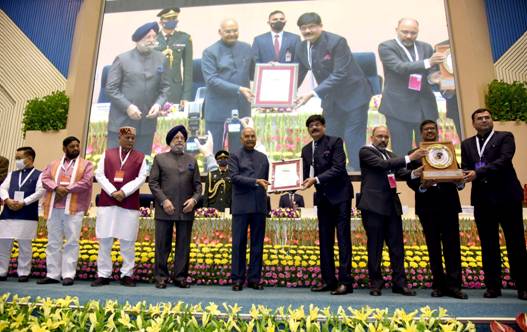
Speaking at the event, the President said that this year’s Swachh Survekshan Awards have special significance because we are celebrating ‘Azadi Ka Amrit Mahotsav’. He noted that Safai Mitras and sanitation workers have continuously rendered their services even during the COVID pandemic. He said that the government is committed to ensure that life of no sanitation worker is put at risk due to unsafe cleaning practices. The President said that effective management of solid waste is essential to keep the cities clean. He stressed that environment conservation has been an integral part of the traditional lifestyle of India. Today whole world is emphasising on environment protection in which focus is on to reduce, reuse and recycle the resources. He noted that good examples are coming out of the idea of ’Waste to Wealth’ and many start-ups are active in these areas. He said that appropriate schemes could be developed to encourage entrepreneurship and investment in these areas.
Hardeep Singh Puri, Union Minister of Housing & Urban Affairs, speaking on the occasion, said that the achievements under SBM-U have been the result of unprecedented collective efforts. He said that today, the Mission has taken the shape of a people’s movement – a true ‘Jan Andolan’. This is also reflected in the massive growth of the Swachh Survekshan which began as a pilot in 2016 among 73 cities, and is the world’s largest urban cleanliness survey today. He said that the next few years will be dedicated to focusing on holistic cleanliness, i.e. Clean Air, Clean Land, and Clean Water. The Minister said that we owe it to our future generations to create greener and inclusive cities. He congratulated the Swachhata Champions of urban India through this celebration, which is appropriately titled Swachh Amrit Mahotsav.
Over the years, Swachh Survekshan (SS) has emerged as an effective tool for transforming the urban landscape. Despite the on-ground challenges posed by COVID-19, a team of over 2,000 assessors visited over 65,000 wards in a record time of 28 days. Maharashtra has successfully bagged a total of 92 awards, the highest by any State in this year’s Survekshan, followed by Chhattisgarh with 67 awards. Additionally, under the Prerak Daaur Samman, a new performance category introduced under Swachh Survekshan 2021, five cities – Indore, Surat, Navi Mumbai, New Delhi Municipal Council and Tirupati were categorized as ‘Divya’ (Platinum). This year’s Survekshan, participated by 4,320 cities, also saw an unprecedented number of citizens’ feedback – over 5 crores, compared to 1.87 cores last year. SS 2021 has also helped identify over 6,000 innovations and best practices in sanitation and waste management from across the urban India.
The second session of today’s event was dedicated to Safaimitras, the frontline soldiers of Swachh Bharat Mission-Urban. Commemorating World Toilet Day (19 November), this session saw the top performers under the first ever Safaimitra Suraksha Challenge being recognized. Indore, Navi Mumbai, Nellore and Dewas emerged as the top performers, across different population categories among 246 participating cities in the Safaimitra Suraksha Challenge, launched last year by MoHUA to eradicate human fatalities from hazardous cleaning of sewers and septic tanks. Among the States, Chhattisgarh and Chandigarh bagged the award for best performing State and Union Territory under the Challenge. In the last one year, the SafaiMitra Suraksha Challenge has been able to propel the ‘manhole to machine hole’ revolution in urban India through initiatives such as credit linkages of SafaiMitras with banks through the National Safai Karamchari Financial Development Corporation (NSKFDC), on-the-job trainings through the Sector Skill Council for Green Jobs and setting up of helpline number 14420 in over 190 cities – a citizens’ grievance platform.
The vision of a Garbage Free India under SBM-U 2.0 was given further impetus by announcing the results of 3-star and 5-star rated cities under the Star Rating Protocol of Garbage Free Cities. A total of 9 cities – Indore, Surat, New Delhi Municipal Council, Navi Mumbai, Ambikapur, Mysuru, Noida, Vijayawada and Patan- have been certified as 5 star cities while 143 cities have been certified as 3 star. The Star Rating Protocol of Garbage Free Cities was introduced as a SMART framework by MoHUA in 2018, to holistically evaluate cities across solid waste management parameters. In 2018, only 56 cities were awarded certification on some star rating. This year, the number has gone up manifold with 2,238 cities applying for the assessment. The mammoth exercise was completed successfully despite the COVID-19 restrictions as is evidenced in the numbers – 1.4 crore photographic evidence collected across 3.5 crore data points, along with 14.19 lakh citizen validation and 1 lakh locations covered during the assessment period.
The spirit of celebration was further enhanced through the release of a song titled ‘Har Dhadkan Swachh Bharat Ki – Reaffirming a Nation’s Commitment to Swachh Bharat Mission-Urban 2.0’ by President of India. The song encapsulates the spirit of the Swachhata movement and is a salute to the commitment of all citizens, especially the children, youth and senior citizens, in the Swachhata journey. The video, which depicts a clean, green and modern urban India, is an effort to reinvigorate people to carry forward the SBM-U 2.0 journey in the days ahead. The link of the song is : https://www.youtube.com/watch?v=CY_ejy6ifwE.
Swachh Bharat Mission-Urban 2.0, launched on 1st October, 2021, will focus on ensuring complete access to sanitation facilities for all. Technology has played a critical role in achieving the outcomes under SBM-U’s journey in the last seven years. Taking a giant leap forward in this digital journey, the Ministry launched the revamped Swachh Bharat Mission-Urban 2.0 website and the integrated MIS portal ‘Swachhatam’.
Additionally, a futuristic and state-of-the-art spatial GIS platform was launched that will further propel the Mission towards smart, data driven decision making. These new digital enablements will further enable the Mission to become paperless, robust and transparent, along with round-the-clock connectivity with States, Cities and stakeholders across the Swachhata spectrum.
Swachh Amrit Mahotsav was thus a celebration of the achievements of cities in the past seven years of Swachh Bharat Mission-Urban and a commitment from cities and citizens to move forward with renewed vigour in the next phase of Swachhata through Swachh Bharat Mission-Urban 2.0.
November 20,2021


